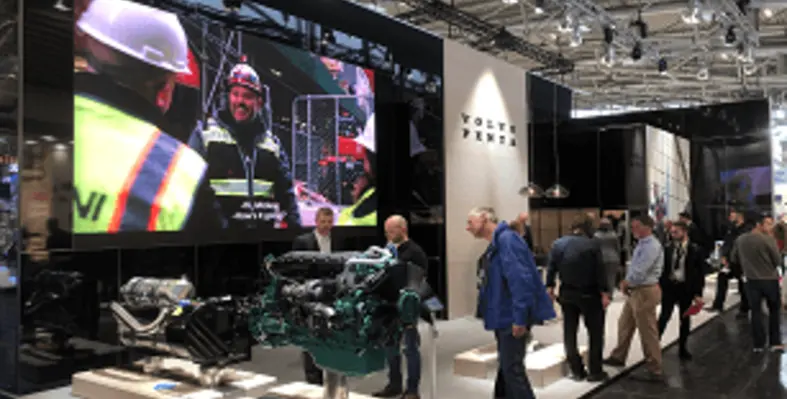At the recently concluded bauma 2022, Volvo Penta highlighted the products and innovations it has developed to meet the industry’s net-zero ambitions
“At Volvo Penta, we believe that strong collaboration with customers and partners is crucial to succeed on our transformation journey,” commented Anders Konradsson, vice president of industrial sales at Volvo Penta. “As part of the Volvo Group, we leverage proven technology, investments and competence from Volvo Trucks, Volvo Buses and Volvo Construction Equipment. We combine this with our customer, market and application knowledge, allowing us to optimise designs and technology for specific machines and applications, considering the duty cycles, climate and environment in which they will operate.”
In line with this drive for sustainability, Volvo Penta launched its new cube battery, which is designed to increase the versatility and flexibility of the company’s electromobility offering.
Volvo Penta’s cube battery and its existing flat-pack battery offer customers reliable power and range with a 40% increase in energy density compared to what was previously available, allowing equipment to work for longer before a re-charge is needed. Measuring 768x684x668mm and boasting a lighter design, the cube battery delivers 90kWh of energy, while the updated flat-pack battery delivers 94kWh of energy.
“The new cubic battery shape is a strong addition to Volvo Penta’s electric driveline offering,” said Eduardo Araujo, electromobility product manager at Volvo Penta. “It has been developed to meet the needs of demanding applications and safety requirements, as well as facilitate alternative packaging designs due to its cubic shape – which allows the batteries to be easily stacked. It delivers increased energy density together with installation flexibility and will help OEMs transition to battery-electric power, who maybe aren’t able to incorporate the length of the flat-pack design into their equipment.”
Low emissions, same performance
Also on display as another product reveal at bauma was Volvo Penta’s dual-fuel hydrogen engine, which can reduce CO2 emissions by up to 80% without impacting on power on performance.
The engine operates in a similar way as the conventional D8 model, but uses mainly hydrogen instead of diesel. If hydrogen is not available, the engine can continue to run on traditional fuel, safeguarding productivity and uptime. This means that with dual fuel technology, assets and business operations can be future-proofed – despite the fact there is not full coverage from a reliable hydrogen infrastructure in place today.
“The new Volvo Penta dual-fuel hydrogen engine offers customers a low-carbon interim solution before suitable zero-emissions alternatives become viable,” explained Anders Wernersson, product manager for the dual-fuel hydrogen engine. “The technology is relatively simple and can be installed with minimal disruption, so we see this as being a cost-effective and robust solution for customers in a variety of applications – including construction and mining – who are looking to transition to net-zero emissions.”
Volvo Penta has partnered with CMB.TECH to develop the dual-fuel hydrogen-powered solution. CMB.TECH provides and trials the hydrogen add-on kit and tank system that works together with the Volvo Penta D8 engine and software. Currently, the engines are being run in test cells to optimise the hydrogen-diesel injection strategy for maximum reliability and emissions savings.
The first engines will be working in end-customers machines in Europe in 2023 as part of a market pilot project, which will be followed by small-scale production. It will be a stepwise introduction based on market and customer demand, and there will be a focus on the fit between the technology and customer needs, ensuring it makes sense to choose a dual-fuel powertrain.
These new products will help Volvo Penta on its way to reaching its ambitious commitment to the Science Based Targets initiative (SBTi), where the company aims to reach net-zero value chain emissions by 2040.
This will be one of the primary considerations of Hannes Norrgren, the newly appointed Volvo Penta industrial president, who commented on his new position, “To be able to lead one of the industry’s top brands in times of disruptive change is an exciting challenge. What we will do over the coming years in relation to our transformation towards sustainable power solutions will define the next era of Volvo Penta Industrial. It will take courage, teamwork and entrepreneurship to succeed, all of which are values that are close to my heart and management approach.”














